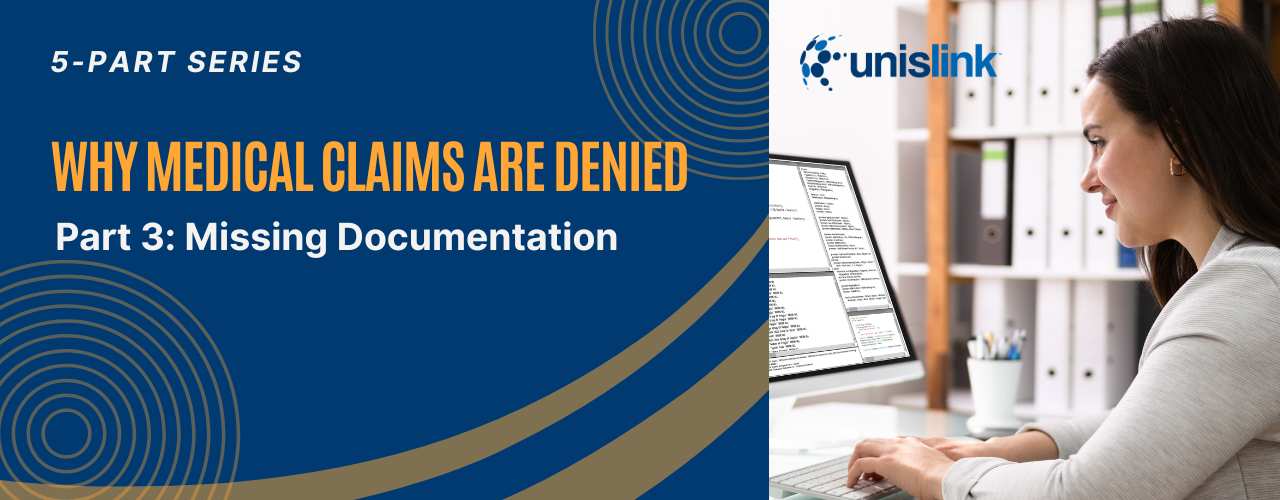Denied medical claims are a top factor in healthcare practices not receiving full reimbursement for the medical services they provide. Accurately submitting medical claims is among the most important revenue cycle processes that ensures a healthcare practice is financially stable.
This article is part 3 in our blog series about common denials where we outline the typical denials experienced by independent practices. In each article, we lay out the typical reasons for those denials with some solutions to improve claim acceptance for optimized revenues.
Blog Series: 5 Common Reasons Medical Claims are Denied
Part 1: The Pitfalls of Coding Errors
Part 2: Lack of Medical Necessity
Part 3: Missing or Incomplete Documentation
Part 4: Service Not Covered by Insurance
Part 5: Missing Deadlines for Claims Submission
Missing or Incomplete Documentation: Ensuring Your Claims Tell the Full Story
Accurate and complete medical documentation is the foundation of efficient claims processing. It serves as the narrative for your patient’s care, painting a clear picture of the diagnosis, treatment, and justification for the services rendered.
Missing or incomplete documentation can significantly hinder your claims, leading to delays, denials, and lost revenue.
Why Proper Documentation Matters
Medical documentation encompasses all the written records pertaining to a patient’s encounter and care. It includes various elements like:
- Diagnosis: A clear and accurate diagnosis forms the foundation of the medical record.
Test Results: Lab results, x-ray reports, and other diagnostic test results provide objective evidence supporting the diagnosis. - Physician Notes: The physician’s notes detail the patient’s symptoms, medical history, treatment plan, and rationale for the chosen course of treatment.
- Progress Notes: These notes document the patient’s response to treatment and any changes made to the treatment plan.
Complete and legible documentation is crucial for accurate claims processing for several reasons:
- Clarity and Transparency: Comprehensive documentation ensures clear communication with the insurance company, eliminating any ambiguity regarding the services provided and their necessity.
- Justification for Services: Detailed records support the medical necessity of billed services, significantly improving the chances of claim approval and maximizing reimbursements.
- Accurate Coding: Proper documentation facilitates accurate coding by providing a clear picture of the services performed, minimizing the risk of coding errors.
The Perils of Incomplete Information: Reasons for Denial
Missing or incomplete documentation can be a major roadblock to claim approval. Here’s how it can impact your reimbursements:
- Delays and Frustration: Incomplete claims often trigger requests for additional information from the insurance company, causing delays in processing and potentially frustrating patients.
- Denials Due to Missing Justification: Without complete documentation outlining the medical necessity of services, insurance companies may deny the claim altogether.
- Misunderstandings and Errors: Illegible handwriting or unclear medical terminology can lead to misunderstandings and errors in processing the claim.
Strategies to Ensure Billing Claims Include Complete Documentation
Streamlining your documentation process and ensuring complete information is key to minimizing denials and maximizing reimbursements. Here are some practical steps:
- Implement Documentation Standards: Develop clear and consistent documentation standards within your practice. This might involve using templates for specific procedures or requiring physicians to dictate notes into an electronic health record (EHR) system.
- Invest in an EHR System: Consider investing in an EHR system to ensure accurate, legible, and readily accessible documentation. EHRs promote standardized templates and reduce the risk of errors associated with handwritten notes.
- Regular Review and Auditing: Conduct regular audits of your medical records to identify and address any documentation gaps or inconsistencies.
Partnering for Efficiency: How Unislink Streamlines Your Documentation Process
At Unislink, we understand the importance of proper documentation in ensuring smooth claims processing. Our experienced team can review your medical records for completeness and clarity before claims are submitted. Additionally, we can work with you to refine your documentation practices and implement efficient workflows to minimize the risk of errors and denials.
UNISLINK MEDICAL CODING SERVICES
By prioritizing complete and accurate documentation, you can avoid the pitfalls of missing information and ensure your claims tell the compelling story of your patient’s care, leading to faster processing and maximized reimbursements for your practice.
If you are struggling with Denials, read our free eBook, which shows how KPIs can help you identify and fix revenue cycle issues.
Next in this series:
5 Common Reasons Medical Claims are Denied – Part 4: Service Not Covered by Insurance
Contact Us Today: Get a free revenue cycle opportunity assessment for your practice.
